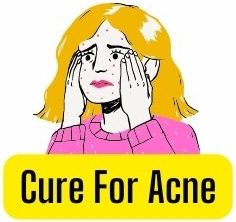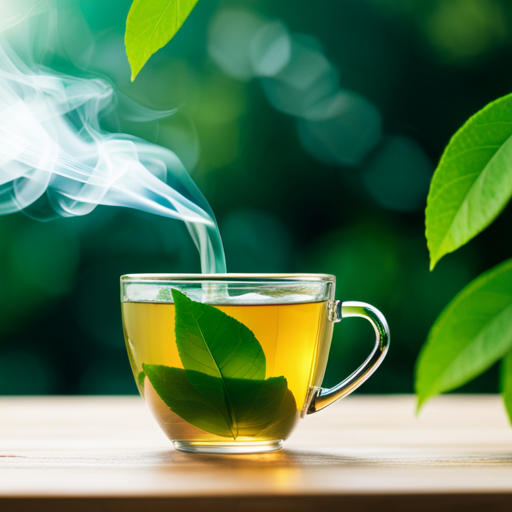Acne, a common skin condition affecting millions of individuals worldwide, can be a source of discomfort and insecurity. While numerous treatments are available, many seek natural remedies to alleviate their symptoms and regain control over their skin’s appearance.
In recent years, the potential benefits of green tea in combating acne have garnered attention due to its rich antioxidant content and anti-inflammatory properties.
This article explores the scientific evidence supporting green tea’s acne-fighting abilities and provides practical guidance on incorporating it into one’s skincare routine.
Through understanding the mechanisms by which green tea may contribute to clearer skin, readers will be better equipped to make informed decisions about their skincare regimen.
Additionally, this article discusses complementary lifestyle changes that may further enhance the effects of green tea in promoting healthy skin.
By empowering oneself with knowledge about natural solutions backed by scientific research, individuals suffering from acne can break free from feelings of helplessness often associated with this condition and take proactive steps towards achieving healthier-looking skin.
Key Takeaways
– Green tea’s antioxidant and anti-inflammatory properties make it a promising natural remedy in combating acne.
– Green tea can regulate sebum production, inhibit bacterial growth, and reduce inflammation associated with acne breakouts.
– Topical green tea products, as well as incorporating green tea into one’s diet, offer potential benefits in reducing acne and improving overall skin health.
– However, individuals should be aware of potential sensitivities, drug interactions, and the importance of maintaining a healthy lifestyle for optimal skin health.
The Science Behind Green Tea’s Acne-Fighting Abilities
Delving into the scientific realm uncovers the impressive acne-combating prowess of green tea, rooted in its potent constituents and multifaceted mechanisms of action.
A predominant component responsible for green tea’s efficacy against acne is its abundant supply of antioxidants, specifically catechins.
These naturally occurring compounds possess powerful anti-inflammatory properties that aid in reducing redness, swelling, and inflammation associated with acne breakouts.
Moreover, these green tea antioxidants have been shown to inhibit the growth of Propionibacterium acnes (P.acnes), a primary factor contributing to acne development.
By attenuating both inflammation and bacterial proliferation, green tea serves as a formidable ally in the fight against this common skin affliction.
Further supporting green tea’s role as an acne adversary are studies that demonstrate its ability to regulate sebum production – an essential factor in controlling breakouts.
Sebum is an oily substance produced by sebaceous glands present within our skin; while vital for maintaining skin health and integrity, excessive sebum production can lead to clogged pores and subsequent development of acne lesions.
Research suggests that topical application or oral consumption of green tea extracts may help regulate sebum secretion by modulating hormonal activity implicated in excessive oil production.
This dual-pronged approach – targeting both inflammation and sebum regulation – underscores how harnessing the superpowers of green tea can effectively combat persistent acne concerns while promoting overall skin health and radiance.
Incorporating Green Tea into Your Skincare Routine
Incorporating green tea into one’s skincare routine can be achieved through various methods, such as consuming the beverage, utilizing topical products infused with green tea extracts, and creating DIY face masks using the natural ingredient.
Consumption of green tea provides internal benefits, while topical application targets specific skin concerns more directly.
Consequently, discussing these approaches will aid in understanding how to effectively integrate green tea into a comprehensive skincare regimen for optimal results.
Drinking green tea
Consuming green tea regularly may contribute to acne reduction, as its natural antioxidants and anti-inflammatory properties not only combat the bacteria causing acne but also help in reducing inflammation associated with it, despite concerns about caffeine content potentially exacerbating the issue.
Green tea cleanses the body from within by detoxifying and removing harmful substances that can lead to acne flare-ups. Additionally, the antioxidant boost provided by green tea aids in neutralizing free radicals responsible for skin damage and aging, further promoting a clear and healthy complexion.
Drinking green tea daily can be an effective way to incorporate this powerful plant into one’s skincare routine; however, moderation is key when considering caffeine intake levels. The table below highlights some of the main benefits of consuming green tea for acne-prone individuals:
| Benefit | Explanation | Recommended Intake |
|---|---|---|
| ——— | ————- | ——————– |
| Antioxidant Boost | Neutralizes free radicals responsible for skin damage and aging | 2-3 cups per day |
| Anti-Inflammatory Properties | Reduces redness and inflammation associated with acne | 2-3 cups per day |
| Detoxification & Cleansing Effects | Helps eliminate harmful toxins that contribute to acne flare-ups | 2-3 cups per day |
| Skin Hydration & Nourishment | Enhances overall skin health through vitamins & minerals naturally present in green tea | 2-3 cups per day |
In conclusion, incorporating green tea into one’s daily routine provides numerous advantages for those seeking freedom from persistent acne issues.
With its potent antioxidants, anti-inflammatory properties, detoxifying abilities, and essential nutrients for optimal skin health, drinking green tea offers a natural solution towards achieving a clear and radiant complexion without resorting to harsh chemicals or treatments.
Topical green tea products
Exploring the realm of topical skincare products reveals a variety of formulations infused with the beneficial properties of Camellia sinensis leaves, offering an alternative approach to harnessing their therapeutic effects on acne-prone skin.
These products, which include green tea cleansers and acne-fighting toners, are designed to deliver targeted benefits while minimizing potential irritation or adverse reactions.
Research has indicated that topical application of green tea extracts may help reduce sebum production, inflammation, and bacterial growth associated with acne development.
The incorporation of topical green tea products into one’s daily skincare routine offers a promising avenue for combating acne by capitalizing on the biochemical compounds naturally present within Camellia sinensis leaves.
With consistent use over time alongside proper hygiene practices and adherence to a balanced diet rich in nutrients conducive towards healthy skin functioning (e.g., omega-3 fatty acids; vitamins A & E), individuals grappling with persistent breakouts may find relief through this evidence-based approach rooted in traditional Asian medicine practices dating back centuries.
DIY green tea face masks
Delving into the world of homemade skincare remedies, one can discover the versatile potential of Camellia sinensis leaves in crafting effective DIY face masks that target acne-related concerns while simultaneously nourishing and revitalizing the complexion.
These masks are not only cost-effective but also offer a natural and chemical-free alternative to commercial products, making them an appealing choice for those seeking a more holistic approach to skincare.
Additionally, incorporating green tea as a key ingredient in toners and exfoliating scrubs further enhances its acne-fighting capabilities.
Scientific studies have highlighted the antioxidant, anti-inflammatory, and antimicrobial properties of green tea which contribute to its efficacy in addressing various skin conditions, including acne.
For instance, creating a simple green tea toner by brewing fresh leaves or using high-quality matcha powder can help tighten pores, reduce inflammation caused by breakouts and prevent bacterial growth on the skin’s surface.
Likewise, combining green tea with other natural ingredients such as honey or oatmeal can result in potent exfoliating scrubs that gently slough away dead skin cells while also soothing redness and irritation commonly associated with acne-prone complexions.
As these formulations harness the innate superpowers of green tea extract along with other natural components, they promote healthier-looking skin free from harsh chemicals.
Additional Benefits of Green Tea for Skin Health
Beyond its acne-fighting properties, green tea offers a myriad of additional benefits for skin health, such as reducing inflammation, preventing premature aging, and protecting against harmful UV rays.
Green tea toners are known to be effective in minimizing the appearance of enlarged pores and balancing the skin’s pH levels. The polyphenols present in green tea provide antioxidant protection that neutralizes free radicals responsible for causing cellular damage and oxidative stress on the skin.
Furthermore, green tea contains an abundant amount of catechins, which possess anti-inflammatory and antibacterial properties that help soothe irritated or sensitive skin.
These compounds also inhibit collagenase—an enzyme responsible for breaking down collagen—leading to improved elasticity and reduced signs of aging. Below is a table highlighting some key benefits of green tea for maintaining healthy skin:
| Benefit | Description | Active Compounds |
|---|---|---|
| ———————- | ———————————————————————————————– | ——————— |
| Reduces Inflammation | Alleviates redness and irritation due to inflammatory skin conditions like eczema or rosacea | Catechins |
| Antioxidant Protection | Neutralizes free radicals that cause oxidative stress on the skin | Polyphenols |
| Anti-aging | Prevents premature aging by inhibiting collagenase activity | Catechins |
| UV Protection | Offers limited defense against harmful ultraviolet (UV) radiation | Epigallocatechin Gallate (EGCG) |
In conclusion, incorporating green tea into one’s skincare routine can not only aid in combating acne but also contribute to overall betterment of their complexion.
The numerous advantages provided by this natural ingredient make it an ideal choice for individuals seeking a holistic approach to skincare while fulfilling their subconscious desire for freedom from harsh chemicals and artificial additives commonly found in commercial products.
Complementary Lifestyle Changes to Fight Acne
In addition to the benefits of green tea for skin health, embracing certain lifestyle changes can further enhance one’s ability to manage acne and maintain a clear complexion. Adopting a holistic approach towards skincare is essential in achieving long-term results and preventing future breakouts.
A combination of healthy diet, stress reduction techniques, proper sleep hygiene, and regular exercise has been proven effective in combating acne and promoting overall skin health.
1. Healthy Diet: Consuming a balanced diet rich in fruits, vegetables, whole grains, lean proteins, and healthy fats helps provide essential nutrients for maintaining optimal skin health. Limiting refined sugars and processed foods may also contribute to reducing inflammation and hormonal imbalances that often trigger acne breakouts.
2. Stress Reduction: Chronic stress has been linked to an increased risk of developing acne due to its influence on hormone levels. Incorporating relaxation techniques such as yoga, meditation or deep breathing exercises can help lower stress levels and improve overall well-being.
3. Proper Sleep Hygiene: Adequate sleep is crucial for skin regeneration and repair processes. Establishing a consistent sleep schedule with sufficient restorative hours (7-9 hours per night) can significantly impact the appearance of the skin over time.
4. Regular Exercise: Engaging in physical activity increases blood flow which delivers vital oxygen and nutrients to the skin cells while removing waste products like free radicals that contribute to premature aging or inflammation associated with acne formation.
Potential Side Effects and Precautions
While green tea and complementary lifestyle changes offer numerous benefits for skin health, it is important to consider potential side effects and precautions when incorporating these practices.
Just as a double-edged sword can both protect and harm its wielder, excessive consumption of green tea may lead to gastrointestinal issues, insomnia, or iron deficiency in some individuals. Therefore, it is crucial to strike a balance by monitoring one’s body reactions and consulting with a healthcare professional if necessary.
Green tea allergies are rare but can occur in some individuals who are sensitive to the plant compounds found within the beverage. Symptoms may include hives, itching, swelling, difficulty breathing, or anaphylaxis – a severe allergic reaction that requires immediate medical attention.
Additionally, green tea contains caffeine which can interact with certain medications or supplements such as ephedrine (a stimulant) or anticoagulants (blood thinners), leading to increased heart rate and blood pressure.
It is essential for those considering incorporating green tea into their acne-fighting regimen to be aware of any existing sensitivities or drug interactions that may potentially cause adverse effects on their overall well-being.
By taking these precautions into consideration and remaining vigilant about one’s body responses to green tea consumption alongside other lifestyle modifications, the journey towards clear skin will be both safe and effective for many seeking liberation from acne woes.
Frequently Asked Questions
How long does it take to see results from using green tea for acne treatment?
The duration required to observe noticeable results from utilizing green tea for acne treatment may vary depending on several factors, such as the severity of acne and individual skin type. However, it is crucial to maintain consistent application of green tea-based products or home remedies in order to effectively address the issue.
Studies have indicated that individuals who incorporated green tea into their skincare regimen experienced a reduction in acne lesions within a time frame of 4-8 weeks, highlighting its potential as a natural remedy.
To fully reap the benefits and attain desired outcomes, an unwavering commitment to incorporating green tea into one’s daily routine is essential.
Are there specific types of green tea that are more effective for acne treatment than others?
In a quest for unblemished skin, one traverses through the verdant fields of various green tea varieties, seeking the most potent acne-fighting ingredients.
Amongst these varieties, Matcha and Sencha emerge as noteworthy contenders due to their higher levels of catechins, particularly epigallocatechin gallate (EGCG), which exhibit strong antioxidant and anti-inflammatory properties that aid in mitigating acne symptoms.
Additionally, these varieties have demonstrated antimicrobial activities against Propionibacterium acnes and Staphylococcus aureus – two major culprits behind acne inflammation.
While further research is warranted to establish definitive conclusions on the superiority of specific green tea types, initial findings suggest that incorporating Matcha or Sencha into one’s skincare regimen may unlock an enhanced potential for liberation from the shackles of persistent acne.
Can green tea be used to treat acne scars or just active acne?
Green tea cleansers have been investigated for their potential role not only in acne prevention but also in the treatment of acne scars. The antioxidant and anti-inflammatory properties of green tea, particularly its main polyphenol, epigallocatechin gallate (EGCG), may help reduce inflammation and redness associated with acne breakouts and promote skin healing.
Although direct evidence regarding the effectiveness of green tea for treating acne scars is limited, some studies suggest that topical applications containing EGCG can improve skin texture and appearance by promoting collagen synthesis and inhibiting matrix metalloproteinases, which are enzymes responsible for breaking down collagen.
Therefore, incorporating green tea-based products into skincare routines could potentially aid in diminishing the appearance of acne scars alongside preventing active acne breakouts.
How does green tea compare to other natural remedies for acne, such as honey or aloe vera?
While it is important to consider the effectiveness of green tea alternatives in treating acne, a comparison between natural remedies such as honey and aloe vera reveals distinct advantages and disadvantages for each option.
In terms of natural remedy comparisons, green tea exhibits anti-inflammatory and antioxidant properties that can potentially reduce sebum production and inhibit the growth of acne-causing bacteria.
Honey, on the other hand, possesses antimicrobial qualities that can help eliminate existing acne while also delivering soothing effects to inflamed skin.
Aloe vera has been lauded for its ability to promote wound healing and reduce inflammation, making it a viable option for addressing both active acne breakouts and residual scarring.
Ultimately, the choice of using green tea or an alternative natural remedy depends on individual preferences and specific skincare concerns; however, incorporating any of these options into one’s daily routine may contribute to improved skin health and a sense of liberation from persistent acne issues.
Is it safe to use green tea in combination with other acne medications or treatments?
Green tea interactions with other acne medications or treatments are generally considered safe, both in topical and oral forms. Research has indicated that green tea possesses anti-inflammatory, antioxidant, and antimicrobial properties, which can potentially enhance the efficacy of conventional acne therapies.
However, it is essential to consult a healthcare professional before combining green tea with other treatments due to individual variations in skin type and potential allergies.
As an evidence-based approach to acne management continues to evolve, the integration of green tea into one’s skincare regimen could contribute to a holistic strategy aimed at achieving clearer skin and enhancing overall well-being.
Conclusion 💭
In conclusion, green tea exhibits a plethora of properties that contribute to its efficacy in combating acne.
The various antioxidants, anti-inflammatory agents, and antimicrobial compounds present in this ancient elixir have been scientifically proven to promote skin health and reduce the occurrence of breakouts.
Furthermore, incorporating green tea into one’s skincare routine and maintaining complementary lifestyle changes may enhance the overall effectiveness of acne-fighting strategies.
As with any treatment plan, it is essential to consider potential side effects and precautions before delving headfirst into this time-honored remedy.




